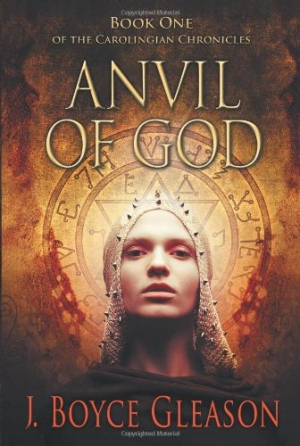It looks like you've stumbled upon a page meant to be read by our code instead of viewed directly. You're probably looking for this page.
Anvil of God
Book One of the Carolingian Chronicles
This raw, fictionalized history is made exciting by a enthralling plot.
This sweeping historical epic dives into a true story of political strife in the year 741 AD. The first of a planned series, Anvil of God will capture the attention of Medieval history fans with its well-crafted dialogue, action, and romantic subplots.
When Charles the Hammer, who ruled over much of Europe in the eighth century, dies abruptly, his four children—three sons and one daughter—rebel against his will, scattering across the continent and inciting political chaos. Each with his or her own loyalties—to the state, to the Catholic Church, to paganism, and to an enemy lover—the siblings are driven by their personal oaths rather than their ambition for the throne.
This is, in part, what makes author J. Boyce Gleason’s story of royal complexities compelling—along with the characters themselves, of whom no one is named the main protagonist. It is the daughter, Trudi, whom the story most follows, however, since who she chooses to marry will mean life or death for the Frankish dominion. Her determination and independence are admirable, but she—as well as the other characters—could be more fully developed, as she is fairly single-minded in her striving.
Despite its length, Anvil of God moves at a swift pace, accentuated by its engaging characters and tension-filled plot. Action, erotic (of which there are many), and simple conversational scenes all find a balance between description, dialogue, and internal monologue to create a perfect narrative pace that sustains attention with suspense. In this scene, Gleason paints an accurate picture of what life and war in 741 may have have been like, weaving description and narrative together to keep the story moving:
“Most people could recognize myriad sounds from their daily lives: water from a brook spilling into a pool, fire crackling through a wet log, a horse’s hooves clopping against hard earth. No one had to see these things to know what they were. Soldiers knew sounds of a whole different kind: arrows puncturing lungs, swords cleaving arms, pikes penetrating horseflesh. … Heden knew those sounds all too well. He had heard them throughout his life. He heard them now. The opposing cavalry lines came together with a sickening crunch. The crux of the battle had begun.”
Gleason also strikes a balance in his dialogue, using easy-to-understand language instead of the stilted phrases many writers of the historical fiction genre employ to make their characters sound like those of their era. Gleason avoids this convention, the more modern-sounding dialogue of his book easing the narrative flow and removing all strain of comprehension while still remaining true to the culture of 741 AD. For example:
“They only need me when there’s fighting—then I’m important. All the ceremony and secret meetings aren’t for me.”
“But won’t you too be mayor?”
“You watch.” He looked at her in earnest. “When they split the kingdom—and they will—I’ll get the short end of it. I’ll get all the fighting and none of the wealth. Carloman will get all the wealth and none of the fighting.”
The cover gives the impression of the fantasy genre, but this is no magical world; it’s raw, fictionalized history made exciting by a enthralling plot. The cliffhanger at the end will have fans waiting impatiently for the next in the series.
Reviewed by
Aimee Jodoin
Disclosure: This article is not an endorsement, but a review. The publisher of this book provided free copies of the book and paid a small fee to have their book reviewed by a professional reviewer. Foreword Reviews and Clarion Reviews make no guarantee that the publisher will receive a positive review. Foreword Magazine, Inc. is disclosing this in accordance with the Federal Trade Commission’s 16 CFR, Part 255.
